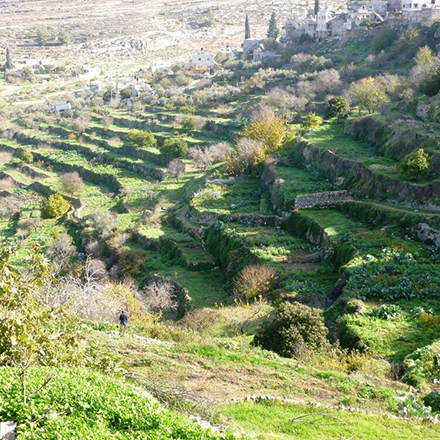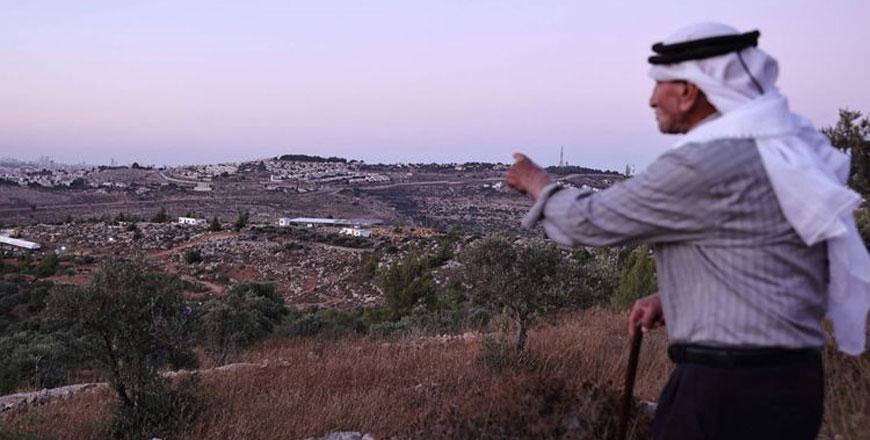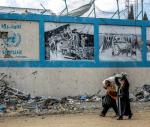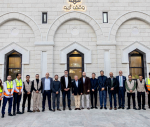You are here
Israeli settlements threaten UNESCO World Heritage sites in occupied West Bank
By Sophie Constantin - Aug 19,2024 - Last updated at Aug 20,2024

Agricultural terraces of Batir (Photo by Centre for Cultural Heritage Preservation (Wisam Oweineh) via UNESCO)
AMMAN — Israel has recently approved the construction of a new settlement, called Nahal Heletz, on a Palestinian UNESCO site near Bethlehem, endangering the integrity of a World Heritage Site. The settlement threatens to impact the village of Battir, a UNESCO site known for its ancient agricultural terraces.
Under international law, all Israeli settlements in the West Bank are considered illegal. “Israel’s ongoing annexation of occupied Palestinian territory, now extending to large areas of the West Bank after unlawfully annexing East Jerusalem, suggests a concrete effort to annex the entire occupied Palestinian territory”, according to a statement from the United Nations, via the Human Rights Office of the High Commissioner.
The UN emphasised that, “Annexation of territory by use of force or threat is categorically prohibited under international law,” and “constitutes an act of aggression that threatens international peace.”
Bezalel Smotrich, Israeli finance minister, said recently on X (formerly Twitter) that his office had “completed its plans for the new Nahal Heletz settlement,” asserting that, “No anti-Israeli and anti-Zionist decision will stop the development of settlements. We will continue to fight the dangerous project of creating a Palestinian state.” This statement reflects Israel’s commitment to expand settlements, despite their clear violation of international laws.
Battir: a UNESCO site at Risk
Battir, a village located southwest of Jerusalem, is renowned for its terraced agricultural fields irrigated by ancient water systems from underground springs. These characteristic stone terraces, potentially dating back to antiquity, have supported the cultivation of olives and vegetables for generations, according to UNESCO.
UNESCO recognised Battir as a World Heritage Site for its integrity (the preserved traditional water system, guaranteed by the families of Battir, who depend on it), authenticity (the cultivation has hardly changed through time), and protection (the site is well protected by Palestinian laws drafted with the UNESCO, the local community and the stakeholders).
Peace Now’s report
The Israeli NGO Peace Now, which advocates for a two-state solution, released a report condemning the new Nahal Heletz settlement, stating that it would be built on land belonging to the Palestinian village of Battir.
“The establishment of Nahal Heletz was decided in a Cabinet meeting in June 2024, as part of a plan to create five settlements,” Peace Now said, revealing that the settlement area would cover 600,000 square metres of UNESCO-designated Palestinian territory, adjacent to Palestinian homes.
“Netanyahu and Smotrich are relentlessly advancing de facto annexation, blatantly disregarding the UNESCO Convention, to which Israel is a signatory,” the organisation noted, adding that “The new settlement at Nahal Heletz will create an isolated enclave deep within Palestinian territory, inevitably escalating friction and security challenges.”
Documenting human rights violations
B’Tselem, an Israeli organisation documenting human rights violations committed by Israel in the Occupied Territories, reported that approximately 500,000 Israelis live in 121 settlements beyond the Green Line (the demarcation line set out in 1949 between Israel and its neighbours), controlling 42% of the West Bank.
Citing official data, maps from the Israeli civil administrations and other testimonies, the organisation researched how Israel has taken control of the land. One major method used by the Israeli government has been to declare Palestinian land as “state land” by distorting ancient Ottoman Law interpretations, leading to land confiscation for settlement expansion. Additionally, 21 per cent of the settlements occupy privately-owned Palestinian land, it said.
To encourage Israelis to move to settlements, Israel offers substantial benefits, such as subsidised housing, free education, and tax breaks, according to B’Tselem.
The establishment of settlements is leading to ongoing human rights violations for Palestinians, including the loss of their property through land seizures, unequal legal systems, limited opportunities and access to resources, restricted movement due to checkpoints and obstacles and obstruction of Palestinian self-determination and statehood, which violates international humanitarian law.
The UNESCO designation
The World Heritage Committee has designated Battir as a UNESCO World Heritage Site in 2014 under the name “Palestine: Land of olives and vines, Cultural Landscape of Southern Jerusalem.” Submitted by Palestine as an “emergency case,” the entire area was designated a UNESCO World Heritage Site and was also inscribed on the List of World Heritage in Danger, after examination by UNESCO experts.
The “in Danger” designation was influenced by the vulnerability of the site to what the experts described as “the impact of geo-political transformations that could bring irreversible damage to its authenticity and integrity,” citing the Separation Wall built by Israel in the West Bank that may isolate Palestinian farmers from the fields they have cultivated for centuries.
A World Heritage Site status not only brings international attention and tourism to the site, but also provides funds for preservation and restoration and ensures the protection of the site under the Geneva Convention against destruction or misuse during wartime. Despite Israel being a signatory to the UNESCO Convention on World Heritage Sites, which prohibits harm to heritage sites even in wartime, the Israeli Cabinet approved the new Nahal Heletz settlement, disregarding these obligations.
Other Endangered Palestinian Heritage Sites
Battir is not the only Palestinian UNESCO site being threatened by the Israeli settlements. Husan and Walajah, both part of the 2014 designation “Palestine: Land of Olives and Vines” World Heritage Site, are also facing risks from Israeli settlement expansion, according to Peace Now and B’Tselem.
Husan, a Palestinian village located 8 kilometres west of Bethlehem, has been severely impacted by the construction of the Israeli Separation Wall in the West Bank, as reported by different human rights organisations. This wall is isolating the villages from different directions, seizing around 90,000 square metres, affecting homes and displacing the cultivations. The village has lost thousands of square metres to Israeli settlements and infrastructure projects, compromising both the village’s heritage and adherence to international law.
The village of Walajah, home to about 3,000 residents, was annexed in 1967 by Israel as part of East Jerusalem, leading to land expropriations for settlement construction. Since then, about half of the 600,000 square metres retained by residents has been expropriated for the Israeli settlements of Gilo and Har Gilo.
Palestinians of Walajah face ongoing challenges, including demolition orders for unauthorised buildings, as the Israeli Municipality keeps denying approval for plans. The Separation Wall built by Israel on Walajah’s land has restricted access to farmland and water sources, impacting local agriculture and shepherding.
International Response
In 2020, 46 UN experts urged the international community to firmly oppose Israel’s annexation plans of parts of the West Bank. “Our call went unheard and we cannot stay silent now,” they said in another statement in 2023, via the Human Rights’ Office of the High Commissioner.
Over the past five decades, Israel has confiscated Palestinian lands and resources, resulting in 270 colonies, housing 700,000 Israeli settlers in the occupied West Bank and East Jerusalem, according to UN figures. “By contrast, Russia’s invasion of Ukraine has been condemned as an act of aggression by the large majority of the Member States of the UN, the Israeli annexation of the Palestinian territory is obfuscated by political rhetoric, debates, and negotiations,” UN experts said in the joint statement.
This double standard undermines the foundations of the UN Charter and the promise of universality of international human rights, 75 years after the proclamation of the Universal Declaration of Human Rights, according to the UN.

Related Articles
BATTIR, Palestinian Territories — On a hillside near Palestinian landowner Olayan Olayan’s olive groves, young Israeli settlers are hammerin
AMMAN — The Palestinian Foreign Ministry on Tuesday praised Jordan for its key role in securing the support of the UNESCO World Heritage Com
Israel’s top court has given the government two months to explain why it has not proposed an alternative route for the West Bank separation wall in a valley near Jerusalem.


















